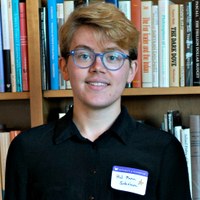Senior Thesis Division
|
Cathleen Buzan (History) Faculty Advisor: George Behlmer
All the President’s Women: Barbara Hackman Franklin’s Women Power in the Nixon White House 1971-1973 In April 1971, President Richard M. Nixon appointed Barbara Hackman Franklin, the first ever White House women’s recruiter, as Staff Assistant to the President in the White House Personnel Office. Her recruiting efforts were unprecedented as Franklin secured the appointments of more women to full-time policy-making positions in the federal government than ever before. Despite these advancements, Franklin encountered a formidable environment of chauvinism which consistently thwarted her program. Regardless, an in-depth analysis of Franklin’s previously unstudied White House papers, housed at the Richard M. Nixon Presidential Library, reveals her as a juggernaut for the burgeoning women’s movement. Furthermore, studying interactions between Franklin and her male colleagues, both cooperative and adversarial, exposes how she flexed political muscle outside of her immediate job description and, by increasing her own visibility in the White House, shaped new attitudes regarding women in government. Access: Project ©Reproduction of this award project in part or in whole without permission of the author is expressly prohibited. |
 |
Sara Leonetti (History & Philosophy) Faculty Advisor: Shirley Yee Rape and the Law: An Examination of the Relationship between Sexist Cultural Attitudes and Washington State’s 1975 Rape Law Revision In 1975, Washington State’s legislature approved a complete overhaul the state’s rape statutes. As was the case in many states, societal assumptions about sex and gender roles were embedded in Washington’s rape law prior to 1975. An emerging Anti-Rape Movement in Washington State pushed for the recognition of these gendered assumptions and advocated for the 1975 comprehensive rape law revision. Though the revision sought to alter many of the gender-biased aspects of Washington’s rape statutes, sexist cultural attitudes hindered the successful application of the revised statutes. This paper examines Washington’s law before 1975 and argues that sexist societal opinions underpinned it. It then turns to discuss the 1975 comprehensive reform. Finally it concludes by asserting that, due to the pervasiveness of sexist attitudes in society, the redrafted law could not successfully remedy all of the problems that lawmakers had intended it to address. Access: Project ©Reproduction of this award project in part or in whole without permission of the author is expressly prohibited. |
 |
Sophia Winkler-Schor (Environmental Science and Research Management & Environmental Studies) Faculty Advisor: Kristiina Vogt How Eco-Drone Monitoring and Successful Conservation Methodology can Mitigate Deforestation Forest cover is declining at an unsustainable rate as development frontiers expand. Though the amount of conservation science being conducted and policy being implemented is ever increasing, forests continue to decline faster than ever before. The conservation science being conducted and policy being implemented is often ineffective and inadequate for conserving forests. To address the issues surrounding forest conservation science and policy, I conducted a literature review, and participated in conservation fieldwork, which lead to me identified four main areas of improvement: (1) diversity of stakeholders in the policy development process; (2) increased communication between conservation scientists and policymakers; (3) integration of multiple current conservation science methods and technology; and (4) utilizing place-based analyses to increase data. Additionally, scientists developing policy may benefit from integrating current science and technologies such as drones which can strengthen and expedite the process of data collection and forest monitoring. Through integrating these approaches the policy developed and implemented will be more effective in conserving forests. Access: Project ©Reproduction of this award project in part or in whole without permission of the author is expressly prohibited. |
Senior Non-Thesis Division
 |
Arista Burwell-Chen (English, Communications, & Political Science) Faculty Advisor: Rachel Sanders How to be a Good Ally: a Guide to Dismantling Colorblindness, White Normativity and Everyday Racism without Erasing Oppressed Voices In light of the Black Lives Matter movement and increasing racialized police brutality, I have encountered many friends and colleagues who feel too paralyzed to talk about racial inequality, or engage in problematic ways. The question arises: how does one speak speak out against discrimination without erasing oppressed voices? I argue that while speaking for others may contribute to erasure, it is far worse not to speak up, and there are more effective ways to be an ally. Using critical race theory and feminist theory, as well as social justice media run by Women of Color, I fashioned a theoretical toolkit to provide potential responses to common mistakes that even well-meaning allies make. Ultimately, my project seeks to interrogate colorblindness, facilitate respectful interactions when addressing systematic oppression, and encourage those in dominant social groups to venture outside spheres of privilege to engage thoughtfully in conversations with members of oppressed groups. Access: Project ©Reproduction of this award project in part or in whole without permission of the author is expressly prohibited. |
|
|
Nora Gunning (Piano Performance & History) Faculty Advisor: James Felak A Musical Collaboration: the Orchestras of Auschwitz In the historiography of the Holocaust, the subject of music is often disregarded in favor of politics, and when it is mentioned it is done so in passing. This paper seeks to understand how Nazis used music as a tool to degrade prisoners and, focusing on Auschwitz, how in one case prisoners used that music as a source of renewed dignity. The research draws mainly on memoirs and interviews from musicians who survived Auschwitz, and includes an overview of the small amount of literature surrounding the topic. Using the voices of the musicians themselves, this project aims to shatter the common misconception that all instances of music in concentration camps were positive experiences for prisoners, while highlighting one instance of rebellion and survival through musical excellence. Due to the scant and misleading literature surrounding the topic, this project recommends further research into this “other side” of music in the Holocaust. Access: Project ©Reproduction of this award project in part or in whole without permission of the author is expressly prohibited. |
 |
Benjamin Ransom (Classical Studies & French) Faculty Advisor: Catherine Connors Bringing the Gods Onstage: Anthropomorphic Deities in Plautus’ Amphitruo and Molière’s Amphitryon Plautus’ “Amphitruo” and Molière’s adaptation are divine burlesque plays that depict surreal scenes of divine cuckoldry and mistaken identity. In these plays a highly comic figure of reverse-anthropomorphism is employed, by which gods are seen in the image of contemporary humans. The gods of Plautus’ play are presented as members of the ancient Roman theatre troupe through the violation of dramatic illusion; the Roman comedian uses his powers as a god-like creator of the comic spectacle to mock the self-important general Amphitryon in a festival atmosphere. In Molière’s adaptation, the god Jupiter is a transparent symbol for Louis XIV, who has the power to engage in sexual affairs regardless of moral consequences due to his god-like status. Thus, in both plays, anthropomorphism is a comic figure which sees humans of the contemporary social world as god-like in order to engage in comic social critique and class-oriented humor. Access: Project ©Reproduction of this award project in part or in whole without permission of the author is expressly prohibited. |
 |
Mona Sangesland (Flute performance) Faculty Advisor: Judy Tsou Gender in Gershwin’s “Porgy and Bess” George Gershwin’s opera “Porgy and Bess” depicts 1930s African-American life in the slums of South Carolina through the romance between the crippled beggar Porgy and the licentious “bad” woman Bess. Bess’ depravity causes much conflict throughout the opera, and she is often perceived negatively as being weak and adhering to gender stereotypes. I, however, viewed Bess as an unfortunate victim of the era in which she lived, a character struggling to balance juxtaposing gender roles. Consequently, this project focuses on the realization of gender portrayals through music, specifically as they pertain to Bess and how she promotes and conversely denies these prescribed roles. My research considers the social expectations for 1930s women, African American culture, as well as analyses in music history and theory in order to demonstrate the use of music as a tool in further understanding gender roles and life for 1930s American women. Access: Project ©Reproduction of this award project in part or in whole without permission of the author is expressly prohibited. |
Non-senior Division
|
|
Reem Sabha (Economics, UW Bothell) Faculty Advisor: Karam Dana The Impact of September 11th on Arab-American Youth The events of September 11th deeply shook the American psyche, leading to a shift in political and social realities that impacted every citizen. Overwhelmingly divisive, the response to September 11th drew a clear boundary between the concept of being an Arab and being an American. The post-9/11 landscape therefore presented a unique challenge to Arab-American youth in terms of forming their identity: within a divisive atmosphere, Arab-American youth had to cultivate an identity that incorporated both cultures simultaneously, with varying rates of success. This study seeks to understand how the post 9/11 atmosphere impacted the identity formation of Arab-American youth. I examine patterns of identity among Arab-American students at the University of Washington, and how factors such as politics, religion, and gender work in an environment of fear that inhibit Arab-American youth from feeling completely accepted in mainstream society. Access: Project ©Reproduction of this award project in part or in whole without permission of the author is expressly prohibited. |
 |
Hal Schrieve (History) Faculty Advisor: Purnima Dhavan Gulbadan and Nur Jahan: The Role of Women in the Creation of the Mughal Court and Imperial Policy Using translated primary sources (principally Gulbadan Begum’s biography of Humayun) and secondary sources, I analyze the position of women in the early Mughal court and how Akbar’s new institutions altered their position. I propose that institutions cloistering and regulating imperial elite women paralleled those which regulated the nobility at large under the new land revenue system, and that early Timurid traditions of women’s power within the court changed but did not diminish. I propose that the scale of the power of women in court was rather magnified and institutionalized. Access: Project ©Reproduction of this award project in part or in whole without permission of the author is expressly prohibited. |
Honorable Mentions
Benjamin C. Lee (International Studies & Chinese)
Faculty Advisor: David Bachman, International Studies
Senior Thesis: Taiwan and South Korea’s Diplomacy in the Age of Transition
Erika VanHorne (History & Economics)
Faculty Advisor: George Behlmer, History
Senior Thesis: Widowhood in the Plymouth Colony: An Inquiry into Family Dynamics through Probate Material
Deborah Indigo Trigg-Hauger (History & Scandinavian Studies)
Faculty Advisor: Terje Leiren, Scandinavian Studies
Senior Non-Thesis Project: Changing Existences in Norway, 1850-1914
Ariel Vardy (Comparative History of Ideas)
Faculty Advisor: Susan Nolen, Education
Non-Senior Project: Behavior Management and Motivation: a Case Study of the Responsive Classroom Approach


